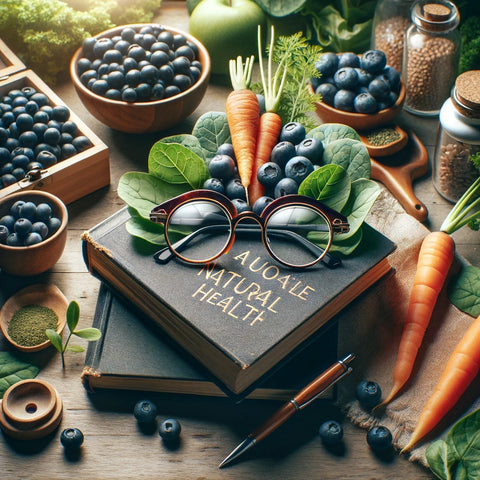Improving Eyesight Naturally with Herbal Remedies
There has been an increase in the number of individuals who are concerned about their eyesight and eye health in this day and age, when screens have taken over our lives. This is because of the fact that screens have taken over our lives.
There are a growing number of people who are turning to natural therapies in order to enhance their eyesight. This is despite the fact that traditional medicine offers a variety of answers for concerns related to eye health. This book will introduce you to the world of herbal remedies and foods that are high in nutrients, both of which have been shown to naturally support and increase vision. You will learn about both of these options during the course of reading this book.
An Overview of the Most Important Aspects of Eye Health
Eyesight, which is often regarded as one of the most valuable senses that we possess, is dependent on a complex system that, in order to function at its optimal level, necessitates the consumption of specific nutrients. The eyes are protected against the potentially harmful effects of oxidative stress by a number of factors, including powerful antioxidants, vitamins A, C, and E, as well as minerals like zinc. These factors all play key roles in the preservation of the eyes.
Supporting Herbal Medicine in the Interest of Eye Health
Bilberry: Bilberry, which is a plant that is sometimes referred to as the "vision herb," is plentiful in anthocyanins, which are antioxidants that have the power to improve night vision and prevent macular degeneration. Bilberry is a herb that is commonly used to treat vision impaired individuals.
Ginkgo Biloba: Ginkgo Biloba, which is well-known for its ability to enhance blood circulation, has the potential to improve eye health by increasing the quantity of blood that goes to the eyes, which ultimately results in improved visual clarity. This is because Ginkgo Biloba possesses anti-inflammatory properties.
Green Tea: Green tea, which is laden in catechins, is excellent for protecting the eyes from ultraviolet (UV) radiation and exposure to potentially harmful light. Green tea is considered to be healthy for the eyes.
Vitamins and minerals that are packed with nutrients and are good for one's eyesight
What are carrots? Carrots are a wonderful source of beta-carotene, which is a precursor to vitamin A and is essential for maintaining healthy vision. This piece of advice has been around for a very long time, and it makes perfect sense.
Both lutein and zeaxanthin, which are found in abundance in leafy greens like spinach, kale, and other greens, are vital nutrients that should be consumed in order to reduce the likelihood of developing chronic eye diseases.
Rich in Omega-3 Fatty Acids: Flaxseeds and fish like salmon are excellent sources of omega-3 fatty acids, which are known to benefit eye health and prevent dry eyes. Flaxseeds also contain a high concentration of omega-3 fatty acids.
The use of natural medicines needs to be a regular part of your regimen.
You are taking a step toward improving your general health and overall wellbeing by include these herbs and foods in your diet. Not only is this beneficial for your eyes, but it is also a step toward improving your overall wellness. This is true regardless of whether you choose to indulge in bilberry jam, drink green tea, or integrate leafy greens into your diet on a daily basis; all of these choices contribute to improved general eye health and clarity of vision.
Including the eating of foods that are good for your eyes as part of your regular routine is something you should do. Consuming these nutrients in the form of smoothies, salads, or teas are all fantastic methods to accomplish this goal.
Complimentary material: In the event that your diet is deficient in some nutrients, you might want to consider taking supplements in order to provide yourself with an additional boost. However, prior to commencing the use of any new supplement, you should always consult with a healthcare professional who has a good reputation for the matter.
It is possible to improve your vision by natural means by following a path that blends modern scientific research with traditions that have been around for centuries. Through the utilization of the natural resources that are at our disposal, such as herbal medications and foods that are abundant in nutrients, we are able to enhance both our vision and our overall eye health. Remember that the key to good eyesight is not only in what we see around us, but also in how we nourish our bodies. This is something that should be kept in mind throughout the day.

Frequently Asked Questions
Some simple and easy steps to prevent vision loss include wearing sunglasses and hats while outdoors, eating nutrient-dense foods beneficial for eye health, maintaining a proper weight, managing stress, and avoiding cigarette smoke.
2. Why is it important to eat nutrient-dense foods geared towards eye health for maintaining good vision?
Consuming nutrient-dense foods that promote eye health is essential for maintaining good vision as these foods provide essential vitamins and minerals that support eye function, protect against age-related vision problems, and contribute to overall eye wellness.
3. Can natural herbs really improve eyesight?
Yes, certain herbs have been recognized for their potential to support eye health. For example, bilberry is rich in anthocyanins and may improve night vision, while ginkgo biloba is known for enhancing blood circulation to the eyes, potentially improving visual clarity.
4. What are some herbs that can help protect my eyes from damage?
Green tea is rich in catechins, which can protect eyes from UV rays and other harmful light. Additionally, herbs like lutein and zeaxanthin, found in leafy greens, are carotenoids in the retina that support eye health.





Leave a comment